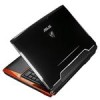Asus G50V User Manual - Page 51
Flash Memory Card Reader - memory change
 |
View all Asus G50V manuals
Add to My Manuals
Save this manual to your list of manuals |
Page 51 highlights
4 Using the Notebook PC Flash Memory Card Reader Normally a memory card reader must be purchased separately in order to use memory cards from devices such as digital cameras, MP3 players, mobile phones, and PDAs. This Notebook PC has a single built-in memory card reader that can use many flash memory cards as shown in the example below. The built-in memory card reader is not only convenient, but also faster than most other forms of memory card readers because it utilizes the internal high-bandwidth PCI bus. IMPORTANT! Flash memory card compatibility varies depending on Notebook PC model and flash memory card specifications. Flash memory card specifications constantly change so compatibility may change without warning. Flash Memory Card Examples ANT. 1394 E-SATA HDMI SD / MMC MS / MS Pro xD Picture Card xD Picture Card MMC (Multimedia Card) MMC Plus RS-MMC (Reduced Size) (with MMC adapter) SD (Secure Digital) MiniSDM(wMitCh (SMDulatidmaepdteiar)Card) MMC Plus RS-MMC (Reduced Size) (with MMC adapter) Memory Stick Micro (with MS adapter) SD (Secure Digital) MiniSD (with SD adapter) Memory Stick (MS) Memory Stick Magic Gate (MG) Memory Stick MicroM(wemithorMySStaicdkapSteelre)ct M(weitmh oMrySSatdMMicakeepmmDatoouerroryy)/PSSrttoiicc/Dkk u(MMoaSPg)rico/GMaGte (MG) Memory Stick Select Memory Stick Duo/Pro/Duo Pro/MG (with MS adapater) IMPORTANT! Never remove cards while or immediately after reading, copying, formatting, or deleting data on the card or else data loss may occur. WARNING! To prevent data loss, use "Windows Safely Remove Hardware" on the taskbar before removing the flash memory card. 51















